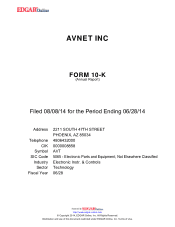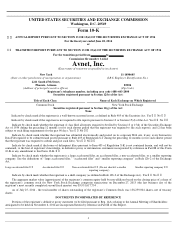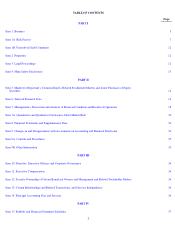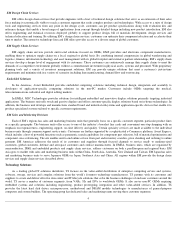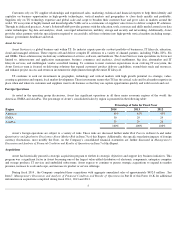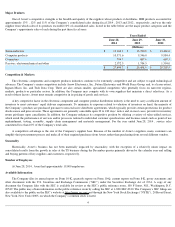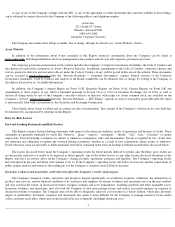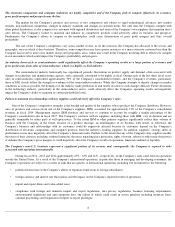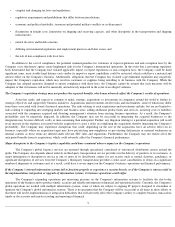Avnet 2014 Annual Report Download - page 11
Download and view the complete annual report
Please find page 11 of the 2014 Avnet annual report below. You can navigate through the pages in the report by either clicking on the pages listed below, or by using the keyword search tool below to find specific information within the annual report.
In addition to the cost of compliance, the potential criminal penalties for violations of export regulations and anti-
corruption laws by the
Company or its third-
party agents create heightened risks for the Company's international operations. In the event that a governing regulatory
body determined that the Company had violated applicable import or export regulations or anti-
corruption laws, the Company could be fined
significant sums, incur sizable legal defense costs and/or its import or export capabilities could be restricted, which could have a material and
adverse effect on the Company's business. Additionally, allegations that the Company has violated a governmental regulation may negatively
impact the Company's reputation, which may result in customers or suppliers being unwilling to do business with the Company. While the
Company has adopted measures designed to ensure compliance with these laws, the Company cannot be assured that such measures will be
adequate or that its business will not be materially and adversely impacted in the event of an alleged violation.
The Company's acquisition strategy may not produce the expected benefits, which may adversely affect the Company's results of operations.
Avnet has made, and expects to continue to make, strategic acquisitions or investments in companies around the world to further its
strategic objectives and support key business initiatives. Acquisitions and investments involve risks and uncertainties, some of which may differ
from those associated with Avnet's historical operations. The risks relating to such acquisitions and investments include, but are not limited to,
risks relating to expanding into emerging markets and business areas, adding additional product lines and services, incurring costs or liabilities
associated with the companies acquired and diverting management's attention from existing business operations. As a result, the Company's
profitability may be negatively impacted. In addition, the Company may not be successful in integrating the acquired businesses or the
integration may be more difficult, costly or time-
consuming than anticipated. Further, any litigation relating to a potential acquisition will result
in an increase in the expenses associated with the acquisition or cause a delay in completing the acquisition, thereby impacting the Company's
profitability. The Company may experience disruptions that could, depending on the size of the acquisition, have an adverse effect on its
business, especially where an acquisition target may have pre-existing non-compliance or pre-
existing deficiencies or material weaknesses in
internal controls as those terms are defined under relevant SEC rules and regulations. Furthermore, the Company may not realize all of the
anticipated benefits from its acquisitions, which could adversely affect the Company's financial performance.
Major disruptions to the Company
’s logistics capability could have a material adverse impact on the Company’s operations.
The Company's global logistics services are operated through specialized, centralized or outsourced distribution centers around the
globe. The Company also depends almost entirely on third-
party transportation service providers for the delivery of products to its customers. A
major interruption or disruption in service at one or more of its distribution centers for any reason (such as natural disasters, pandemics, or
significant disruptions of services from the Company’s third-
party transportation providers) could cause cancellations or delays in a significant
number of shipments to customers and, as a result, could have a severe impact on the Company's business, operations and financial performance.
If the Company
’
s internal information systems fail to function properly or experience a security breach, or if the Company is unsuccessful in
the implementation, integration or upgrade of information systems, its business operations could suffer.
The Company's expanding operations put increasing pressure on the Company's information systems to facilitate the day-to-
day
operations of the business and to produce timely, accurate and reliable information on financial and operational results. Currently, the Company's
global operations are tracked with multiple information systems, some of which are subject to ongoing IT projects designed to streamline or
optimize the Company's global information systems. There is no guarantee that the Company will be successful at all times in these efforts or
that there will not be implementation or integration difficulties that will adversely affect the Company's ability to complete business transactions
timely or the accurate and timely recording and reporting of financial
9
•
complex and changing tax laws and regulations;
•
regulatory requirements and prohibitions that differ between jurisdictions;
•
economic and political instability, terrorism and potential military conflicts or civilian unrest;
•
fluctuations in freight costs, limitations on shipping and receiving capacity, and other disruptions in the transportation and shipping
infrastructure;
•
natural disasters and health concerns;
•
differing environmental regulations and employment practices and labor issues; and
• the risk of non-
compliance with local laws.

